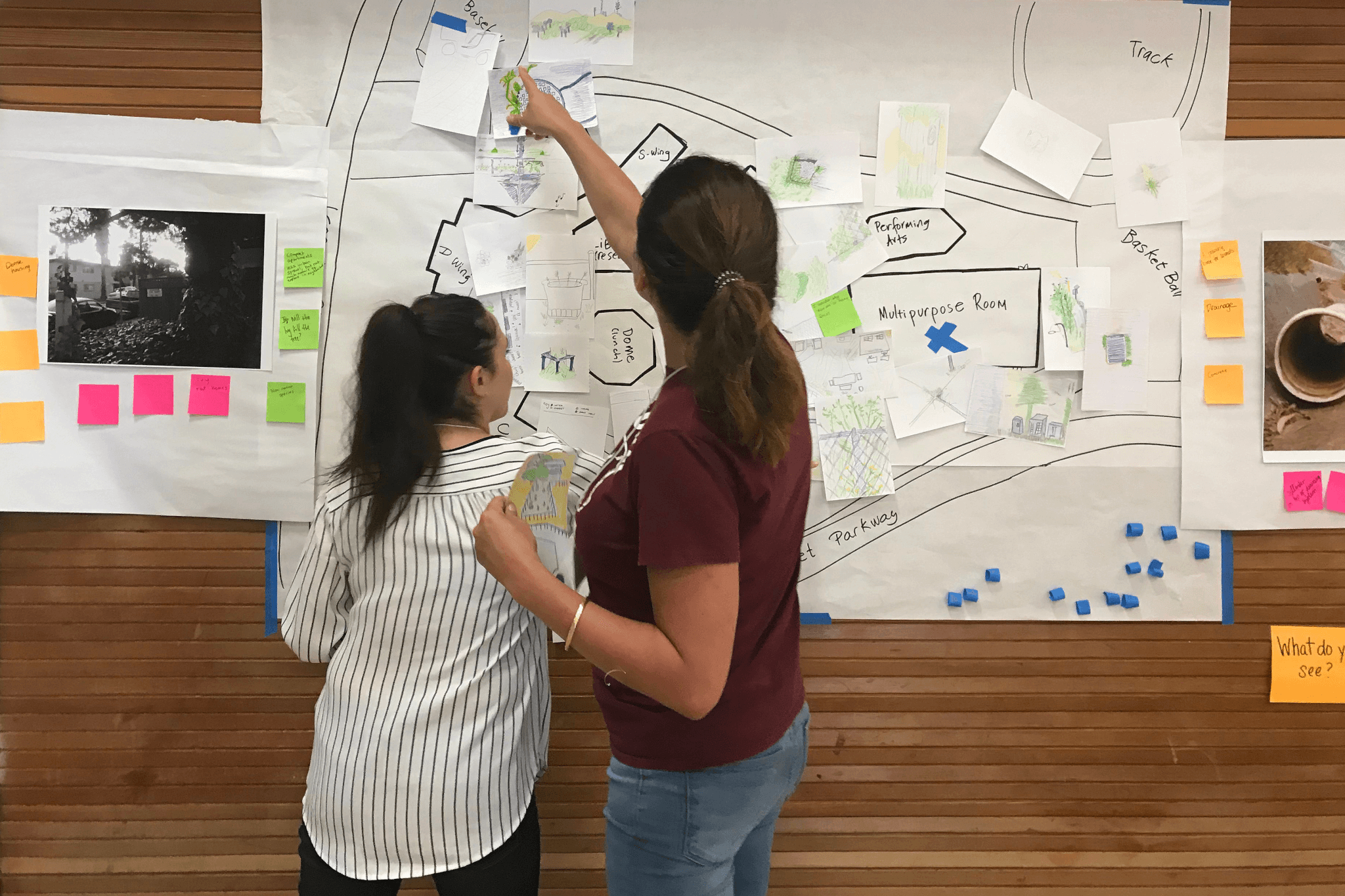The challenge: How to equitably increase access to environmental and arts knowledge for 4,000 K–12th grade students countywide in just a few months? How to make sustainable changes that will support and transform the landscape after the end of one-time funding?
To meet the challenge, the Marin County Office of Education (MCOE) partnered with organizations including Ten Strands, State Environment and Education Roundtable, Youth in Arts (YIA), and the California Mathematics Project: North Coast to create Advancing Teaching and Learning in the Arts and Sciences (ATLAS). Using the lens of the California Environmental Principles & Concepts (EP&Cs), we designed a four-day Science, Technology, Engineering, Arts, and Mathematics (STEAM) institute.
Our goal was to serve educators from across the county to develop multidisciplinary integrated units of study, based on a local environmental phenomenon, that could be shared within and across schools, districts, the region, and the state.
Our STEAM Dream Team: Local, Regional, and National Experts
The ATLAS institute was unique in its diversity of teachers (over 60 TK–12 educators participated) and facilitators, including national, regional, and local organizations and institutions. Ten Strands served in an advisory capacity, and provided guidance on community-based organization partnerships and engagement. Aquarium of the Bay, The Marine Mammal Center, NatureBridge, Marin Environmental Literacy and Learning Collaborative, Slide Ranch, Wildcare, Marin Municipal Water District, Project Coyote, and the Golden Gate National Recreation Area were engaged, consulting with educators in curricular development and participating in a resource fair.
- Director of educational services at MCOE Eileen Smith created the ATLAS framework and supervised all aspects of the four-day institute. ATLAS grant project director and assistant project consultant with MCOE Michelle Drake facilitated all aspects of the implementation of the institute.
- Director of the State Education & Environment Roundtable Dr. Gerald Lieberman supported our analysis of systems thinking and guided our understanding of how to embed the EP&Cs into academic disciplines.
- Youth In Arts, a nonprofit organization whose focus is building visual and performing arts skills for students of all abilities, supported arts integration and culturally relevant teaching strategies. Executive director Miko Lee led a team that included visual arts director Suzanne Joyal, program director Kelsey Rieger, and visual arts specialist Cathy Bowman.
Youth In Arts strategies helped keep equity and culturally responsive teaching at the forefront, while offering multiple strategies to promote communication, presentation, and collaboration of learning experiences.
- Mill Valley School District’s coach for global competence integration Rod Septka created a case study module that identified a local issue to explore global issues and perspectives. The California Math Project’s Dr. Ben Ford, professor of mathematics and statistics at Sonoma State University, supported integration of measurement and mathematical sources using the case study documents.
- Marin STEAM and Science teacher-leader Nick Williams directed our thinking on the engineering cycle and inquiry process for science investigations. Adam Singer, technology and engineering teacher at Davidson Middle School, helped to support representation of solutions in the different forms of models, prototypes, and physical representations.
- Our external evaluator, Nada Djordjevich of West Coast Strategic, provided tools for formative and summative reflection for continuous improvement.
At the heart of our work was the goal to develop learning opportunities that supported youth in becoming environmental advocates and stewards, engaged in understanding their local world. The ability for teachers to provide authentic learning experiences for all of their students to develop identity, agency, and ownership over their learning was central to the design of the lessons. Throughout the entire institute, our learning and experience was documented on the Making Learning Visible (MLV) wall focusing on the process using photographs, quotes, inquiry, and drawings. The MLV wall reflects how learning is purposeful, social, representational, empowering, and emotional.
Keynote speakers each morning helped frame the day’s learning experiences, focusing on equity, engagement, empowerment, and arts integration. On day one, YIA director Miko Lee opened the institute by acknowledging that our meeting was taking place on Miwok occupied land, and spoke to how culturally responsive teaching supports equitable access, voice, and engagement for all youth. On day two, students from the Sunrise Movement described their experience with youth activism, and discussed how to engage and empower students to become changemakers for their communities. On day three, internationally recognized local artist and activist Favianna Rodriguez connected climate change to issues of culture and social, environmental, and racial justice in her keynote. On day four, YIA’s Nydia Algazzali Gonzalez’s keynote highlighted the positive impact of arts integration on the success of disadvantaged student populations, and shared ideas for integrating the arts into the classroom.
ATLAS was designed so that educators would be able to experience the same active learning that we wanted them to replicate for students. For example, our teachers participated on an environmental phenomena walk around the San Jose Middle School in Novato to discover, observe, and draw upon interactions we found between humans and nature. This activity was informed by the Discovering Phenomena & Community Mapping process, and resulted in “birds-eye view” maps of the school campus. Teachers created Venn diagrams in small groups, noting human systems, natural systems, and the interactions of both. These strategies and practices were designed to be accessible to all TK–12 students, and focused on place-based learning so that students develop a deeper relationship to the world around them—and a more complete understanding of their location in it.
Members of our STEAM dream team led a case study investigation of how sea level changes impact a local community. We provided primary source documents, including visuals, mathematical data, and narratives to understand multiple perspectives and viewpoints. Using issues explored in the case study, teachers participated in an engineering cycle design process to develop meaningful questions and solutions that respond to the constraints of the problem. Finally, our educators built prototypes and models, and presented their solutions.
Preliminary data suggest significant impact on teacher mindset and student engagement:
- 100% of surveyed participants would recommend the program to others.
- There was a significant increase in the percentage of educators describing knowledge of the EP&Cs, arts integration, and STEAM practices.
- The vast majority of educators elected to participate in additional voluntary follow-up sessions, and 20% recruited additional partners to share their new resources with them.
- The first cohort of teachers who piloted units for summer school described “increased joy” in teaching, renewed enthusiasm for professional learning, and innovation that they described as carrying over into the academic year.
- Student attendance, behavior, and portfolio measurements indicated higher levels of youth engagement in their learning over prior summer school programs.
- 100% of teachers who attended the institute identified strategies and activities that they said they would implement as embedded practices.
One teacher said, “I will be focusing my teaching with a climate-culture lens and utilizing a visual learning wall to track our learning.”
In September 2019, the ATLAS STEAM Symposium was held at the MCOE showcasing the work done over the summer, and reflect on the sustainability of the program. The timing of the event was particularly resonant, occurring just days after the United Nations Climate Summit and youth climate activist Greta Thunberg’s visit to the United States. Over seventy educators, community organizations and leaders, funders, and North Bay State Assemblymember Marc Levine attended the event. Mr. Levine encouraged the attending educators to support youth-led research and activism, and discussed how his office had previously worked with groups of students from Marin County to write two environmental bills that were passed with bipartisan support. Educators reflected on their continued excitement as they continue implementing ATLAS units, and how the process had deeply changed their practices.
The ATLAS units will be available on the MCOE website in November, 2019.





